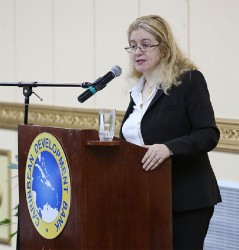Héla Cheikhrouhou, the Executive Director of the newly-established UN Green Climate Fund has assured that the mechanism does not seek to be bureaucratic and developing countries can choose the projects they want prioritised.
“We will adopt a country-driven approach,” Cheikhrouhou, a Tunisian national, told a full house at the Pegasus Hotel on Tuesday evening, when she delivered the Caribbean Development Bank’s (CDB) 15th William G. Demas Memorial Lecture. “The Fund is now ready for business,” she said to applause from those gathered including Prime Minister Sam Hinds and Prime Minister of St. Kitts and Nevis Dr. Denzil Douglas, among other dignitaries.
The Green Climate Fund is a new multilateral fund that was agreed by Parties at the 2010 United Nations Framework Convention on Climate Change conference held in Cancun, Mexico, and designated as an operating entity of the Convention’s financial mechanism. The Fund’s purpose is to promote, within the context of sustainable development, the paradigm shift towards low-emission and climate-resilient development pathways by providing support to developing countries to help limit or reduce their greenhouse gas emissions and to adapt to the unavoidable impacts of climate change.

Last week, the Fund’s Board successfully reached agreement on essential requirements for the Fund to move towards commencing its initial resource mobilisation, including a results management framework, the initial proposal approval process, the guiding framework and procedures for accrediting entities, and the Fund’s financial risk management and investment frameworks
Calling climate change the greatest challenge of this century, Cheikhrouhou pointed out that the world has not yet experienced the full rise in temperature given the levels of greenhouse gases emitted. “We may not know the full impacts of our emissions over the last two decades until the (2040’s),” she said. The official pointed out that Caribbean Small Island Developing States, although they have caused little of the emissions, will pay a heavy price for the global inaction in reducing emissions. She said that for some countries, such as Haiti, losses could be up to 75% of GDP by the end of this century.
The challenges in dealing with the impacts of climate change is significant and the expectations of the Fund are great, Cheikhrouhou observed. Public and private beneficiaries can access grants and concessional climate finance and they want to aim for a balance of mitigation and adaptation measures, she said.
The official assured that a significant portion of the adaptation funds will go towards the most vulnerable countries and they want to ensure that developing countries take ownership and will adopt a country-driven approach. The Board of the Fund is split 50/50 between developed and developing countries-which she hailed as a first for a multilateral financial institution- and decisions are reached by consensus.
The accrediting of National Designated Authorities to interface with the Fund and those entities proposing projects will be done. The official noted that proposals can come from public, private and not-for-profit entities. “The Fund does not aspire to become yet another large bureaucracy,” the Executive Director said.
Cheikhrouhou said that they have looked at previous funds such as the UN Clean Development Mechanism and Global Environment Facility and will be building on them, while fast-track accreditation of entities who have undergone the processes of these bodies has been mulled. The Executive Director also said that Readiness Grants will be made available to countries as they prepare to access financing. “The Fund has to be flexible and responsive,” she noted.
Executive Secretary of the UN Framework Convention on Climate Change Christiana Figueres has said that the initial capitalisation of the GCF should be at least US$10 billion, with the first meeting to mobilise the funds expected to take place in June/July. It is expected that the fund will spur UN treaty talks between 194 nations that aim to devise a new deal to fight climate change by 2015. Developed nations have pledged to ramp up climate aid to poorer countries to US$100 billion a year by 2020, with an unspecified portion of the cash flowing through the Green Climate Fund.




